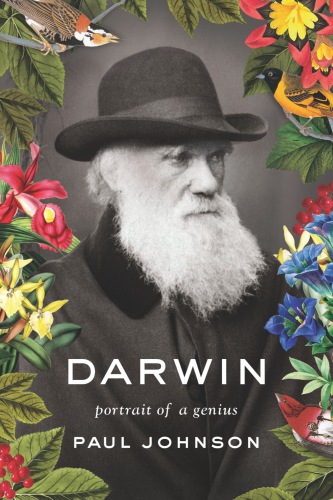
Darwin
Portrait of a Genius
کتاب های مرتبط
- اطلاعات
- نقد و بررسی
- دیدگاه کاربران
نقد و بررسی

July 23, 2012
Renowned historian Johnson (Modern Times: The World from the Twenties to the Nineties) rehearses the already well-known facts of Darwin’s life and work, among them his descent from a distinguished lineage of working scientists; his wealth; his voyage on the Beagle as a gentleman-naturalist; his plodding development of the idea of natural selection and his passionate marriage to his first cousin Emma Wedgewood; and his inability to forgive God over the death of his favorite daughter, Annie. Johnson does call Darwin’s ability as an anthropologist into question, observing that Darwin did not bring the same acute power of observation he showed when studying birds, sea creatures, insects, plants, and animals, but no followers of Darwin have ever taken the great naturalist’s treatment of the Fuegans in the Origin as true or as a model of good scientific observation. Johnson points out that Darwin lost control over his own theory, as when Darwin decided that in order to be internally coherent natural selection had to be comprehensive and universal, yet, as thinking creatures, humans discover ways to frustrate natural selection. Although Johnson reveals very little new about Darwin and his work, this little sketch reminds us why Darwin’s theory of natural selection endures and continues to provoke controversy.

September 1, 2012
A provocative short biography of one of the most influential scientists of all time. Historian and prolific biographer Johnson (Socrates: A Man for Our Times, 2011, etc.) begins by noting the importance of heredity in Darwin's accomplishment. Both his grandfathers and his father, arguably geniuses in their own right, bequeathed to Charles the intellectual tools to pursue science, plus the financial security to do so without the compromises of making a living. In addition to a first-rate education, he received the opportunity to join the HMS Beagle expedition, gathering the material evidence for his theory of evolution. Johnson quickly summarizes the key events of Darwin's formative days, then devotes the meat of the book to his development of the theory and the publication of The Origin of Species. Darwin's long delay in publishing his theories may have been based on a fear of religious opposition, but Johnson argues that the opposition was comparatively mild. Unfortunately, writes the author, Darwin's failure to recognize Gregor Mendel's work on heredity, published only a few years after Origin, deprived him from recognizing the final element needed to explain how natural selection works. Johnson also points to what he considers two central flaws in Darwin's work: a too-literal acceptance of Malthus' theories and insufficient understanding of anthropology. More pernicious, according to Johnson, was Darwin's insufficient understanding of the non-Western societies he encountered. He too easily swallowed second- and thirdhand accounts that portrayed Maoris and other native peoples as bordering on subhuman. Together, Johnson writes, those elements led to social Darwinism, a philosophy that was used to justify the worst atrocities of the modern era, from British colonial oppression to Hitler to Pol Pot. While it may be an unfair accusation, it's certainly sobering. A probing, well-written overview of Darwin's impact.
COPYRIGHT(2012) Kirkus Reviews, ALL RIGHTS RESERVED.

February 15, 2013
Popular historian Johnson tackles flawed genius Charles Darwin, who became an icon in society as the author of "On the Origin of Species". This brief work imparts the social context of Darwin's time and outlines contemporary science and details of the man's personal and scientific life. We also hear about social Darwinism and its role in history for good and ill. Read by John Curless, this title is recommended to those looking to learn about Darwin, his research, and natural selection's impact on society over time. VERDICT Johnson's work differs from others in that it highlights Darwin's shortcomings while describing the history of natural selection and his groundbreaking revelations.--Eric D. Albright, Hirsh Health Sciences Lib., Tufts Univ., Boston
Copyright 2013 Library Journal, LLC Used with permission.

October 1, 2012
Always provocative, historian Johnson critiques Charles Darwin, whose insight into evolution by natural selection he acknowledges but whose intellectual weaknesses he scores as hindrances to Darwin's achieving more in science. Johnson writes that Darwin was a procrastinator, poor at math, and ignorant of foreign languages. The charges asserted, Johnson raises them at particular points in his narrative of Darwin's life. Darwin's habit of delaying publishing to conduct overly meticulous research, for example, nearly defeated his claim to fame. On the Origin of Species was panicked into print by Darwin's fear of preemption by Alfred Russel Wallace. By Darwin's subsequent publications Johnson is but mildly impressed, partly because some do not hold up well (The Descent of Man) and partly because Darwin pursued tangents at the expense of theorizing a mechanism of heredity, as Gregor Mendel did. This was Darwin's missed opportunity, which delayed the genetics revolution and opened conceptual space for the pernicious doctrines of social Darwinismso runs Johnson's argument. Characteristically pithy and incisive, the ever-popular Johnson offers a Darwin who will be much in demand.(Reprinted with permission of Booklist, copyright 2012, American Library Association.)

























دیدگاه کاربران